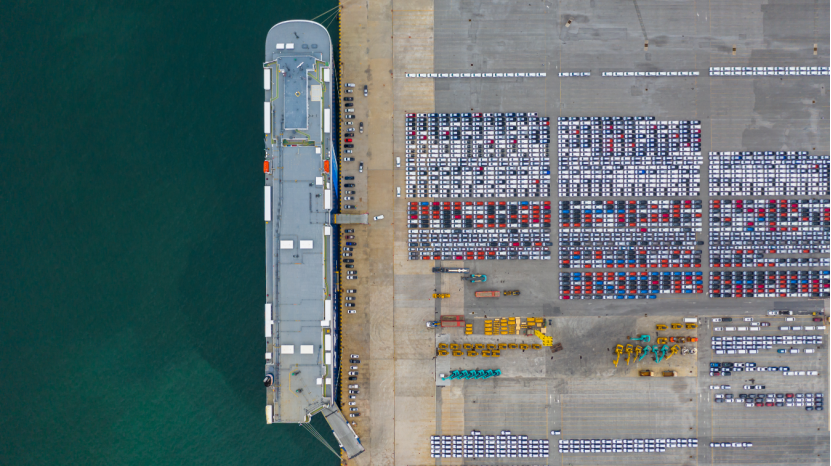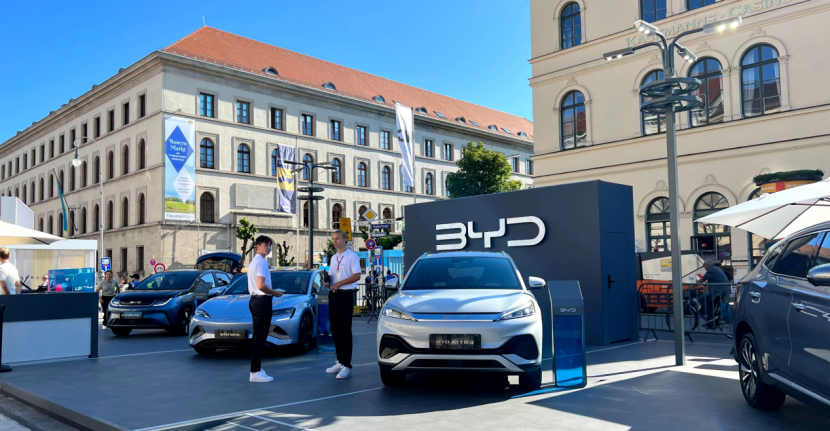Behind the Export Surge of 2 Million New Energy Vehicles, Chinese Manufacturers Transition from 'Product Export' to 'Ecosystem Co-construction'
![]() 04/03 2025
04/03 2025
![]() 546
546
Data reveals that in 2024, China exported over 2 million new energy vehicles, marking a 12% year-on-year increase and solidifying China's position as the world's largest exporter of such vehicles for the second consecutive year. However, beneath this scale expansion lies prominent challenges such as intensifying international market competition, high trade barriers, and data compliance issues.
At the 2025 China Electric Vehicle 100 Forum, numerous industry experts and corporate representatives concurred that 'going overseas' is not merely an expansion at the trade level but a profound transformation encompassing technology, ecosystems, and strategic layout. This transformation spans from manufacturing bases in Southeast Asia to R&D centers in Europe, and from single product exports to the coordination of the entire industry chain. As Wang Chuanfu, Chairman of BYD, stated at the forum, "China's new energy vehicle technology, products, and industrial chain are already 3-5 years ahead of the world, giving us the confidence to venture overseas."
▍A Compulsory Question Demanding a 'Symbiotic Bridge' Mindset
The globalization of China's new energy vehicles has transitioned from 'product export' to a new stage of 'technology leadership' and 'ecosystem co-construction'. From January to February 2025, China's electric vehicle exports amounted to $7.407 billion, a 5.62% year-on-year increase, with an average price of $16,487 for pure electric passenger vehicles. This growth is attributed to the deepening of technology export: Lantoo Automobile has established an R&D center in Europe, integrating core technologies such as battery management and intelligent driving with local supply chains; BYD, through its 'technology + ecosystem' model, has invested in building a factory in Rayong, Thailand, attracting over 50 supporting enterprises to settle there, thereby constructing a full chain from technology to manufacturing and then to services. This cooperation model has increased the penetration rate of electric vehicles in Thailand from 1% to 13% within three years, with 90% of the market share occupied by Chinese brands.
The globalization of China's new energy vehicles has evolved from a single product export to a systematic project encompassing technology export, localized production, brand co-construction, and industrial chain empowerment. The path to participating in global development has gradually entered the 4.0 era: the early 1.0 trade model, primarily focused on complete vehicle exports, has gradually declined due to trade barriers such as EU anti-dumping investigations. Automakers have shifted to the 2.0 localized production model: BYD is constructing the first ASEAN factory for pure electric products in Thailand with an annual capacity of 150,000 units, and Changan Automobile is deploying a 100,000-unit annual capacity base in Thailand, achieving regional penetration through the CKD/SKD model.
The more advanced 3.0 brand cooperation model breaks through market barriers through joint ventures, such as Chery and Spain's EBRO co-branding and sharing R&D and sales networks, and Leapro Motor and Stellantis Group establishing a joint venture 'Leapro International' to promote localized production in Europe. The 4.0 ecosystem co-construction model signifies a deeper level of globalization: Geely exports technical standards and supply chain systems to Proton in Malaysia, helping its sales grow by over 130%; Great Wall Motors promotes a full industrial chain layout from battery production to charging networks in Thailand, empowering local industrial upgrading. In the view of Tang Liming, Chief Product Strategist of Geely Auto Group, the globalization of the automotive industry is an inevitable trend but also a marathon that cannot be achieved overnight. "Globalization is not a choice but a compulsory question; it's not a solo bridge but a symbiotic bridge."

Technology export has emerged as a pivotal lever to leverage emerging markets. Yusabong Laonur, President of the Electric Vehicle Association of Thailand, noted that technological cooperation and investment from Chinese enterprises have fueled a surge in electric vehicle production in Thailand, from less than 1,000 units in 2023 to 58,000 units in 2024, with plans to achieve a 30% share of zero-emission vehicles by 2030. In developed markets, intelligence has become the cornerstone for breaking the deadlock. Deng Chenghao, Vice President of Changan Automobile, emphasized that AI empowerment is the key to future competitiveness. Changan has unveiled a full-scenario intelligent driving solution and plans to mass-produce solid-state batteries by 2027. This technological iteration capability enables Chinese automakers to maintain competitiveness through localized smart manufacturing despite EU tariffs.
While exporting technology, Chinese automakers are also promoting the reconstruction of global industrial chain standards. The 'vehicle-road-cloud integration' solution proposed by Hou Jinlong, President of Huawei Digital Energy, has been implemented in Southeast Asia, the Middle East, and other regions. Christian Hochfeld, an expert from the German transport transformation think tank, commented, "Chinese enterprises are using technology as a bridge to build localized production systems with global partners. This 'reverse joint venture' model is driving regional industrial upgrading."
▍Strategic Upgrading Amidst Compliance Barriers
Despite the robust momentum of China's new energy vehicles going overseas, there are underlying concerns and challenges. Su Bo, former Vice Minister of the Ministry of Industry and Information Technology, warned at the forum that the current international trade environment is complex and ever-changing, with policies such as EU anti-subsidy investigations and the Carbon Border Adjustment Mechanism (CBAM) placing higher demands on Chinese automakers' cost control and compliance capabilities. In the first half of 2024, affected by EU investigations, China's new energy vehicle exports to Europe dipped by 35% quarter-on-quarter at one point.
In response, BYD, Geely, and other enterprises have adopted the strategy of 'localized production in Europe': BYD's Hungary factory will commence production by the end of 2025 with an annual capacity of 150,000 units; Geely is deploying a factory in Spain to cover the EU and surrounding markets. This 'offensive defense' strategy not only circumvents tariffs but also garners the support of local governments – Hungary regards BYD's factory as a 'benchmark for green industrial transformation'.

Furthermore, cross-border data measures have become a focal point. Zhang Yongwei, Vice Chairman of the China Electric Vehicle 100, emphasized the urgent need to establish a 'safe, controllable, and mutually trusted' cross-border data flow mechanism due to significant differences in data security regulations among countries. To this end, automakers are reinforcing the construction of localized data centers to ensure compliance with regulations such as the EU's GDPR; they are also promoting mutual recognition of international standards, for instance, jointly establishing a data cross-border flow framework with ASEAN, reducing the certification cycle from 18 months to 9 months, and lowering compliance costs for Chinese automakers.
Beyond compliance issues, brand recognition and cultural fit of Chinese automobiles have emerged as another significant shortcoming. A McKinsey report indicates that European consumers generally have lower brand recognition of Chinese brands compared to Japanese and Korean brands but significantly higher satisfaction after experiencing them. To address this dilemma, automakers are shifting from 'product marketing' to 'cultural penetration'. For example, BYD has launched a 'smart cabin + low-carbon life' concept store in France, blending electric vehicles with environmental protection concepts; XPeng's G9 is reshaping its premium image in the Norwegian market with its 800V high-voltage platform and 5-minute 200km fast charging technology. These initiatives are altering European consumers' perceptions of Chinese products.
Additionally, Shu Xueming, Assistant General Manager of Chery International, mentioned that factors such as the global impact of DeepSeek and China's 70% global market share in drones are reinforcing the 'technology' label of Chinese brands.
The overseas expansion of Chinese electric vehicles has transcended simple commercial expansion, becoming a vital driving force for global automotive industry transformation. However, in the long run, unlike the meticulous planning of enterprises from the United States, Japan, Germany, and other countries going overseas, the overseas expansion process of some Chinese enterprises has been significantly accelerated. This is the inevitable path for Chinese manufacturing to venture overseas. In the realm of electric vehicle products, through technology empowerment, ecosystem co-construction, and model innovation, Chinese automakers are transforming from 'participants' to 'rule-makers'. Facing the future, going overseas is a long-term endeavor deeply rooted in the local market. Wang Chuanfu's viewpoint is quite representative: "Adhere to open innovation and excel in going overseas through complementary advantages and open cooperation."
Typesetting by Yang Shuo | Image Source: Shutterstock, BYD







